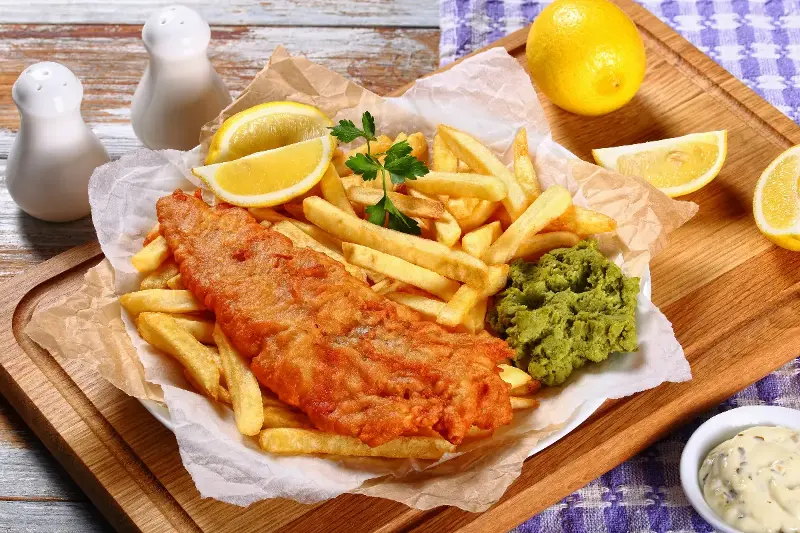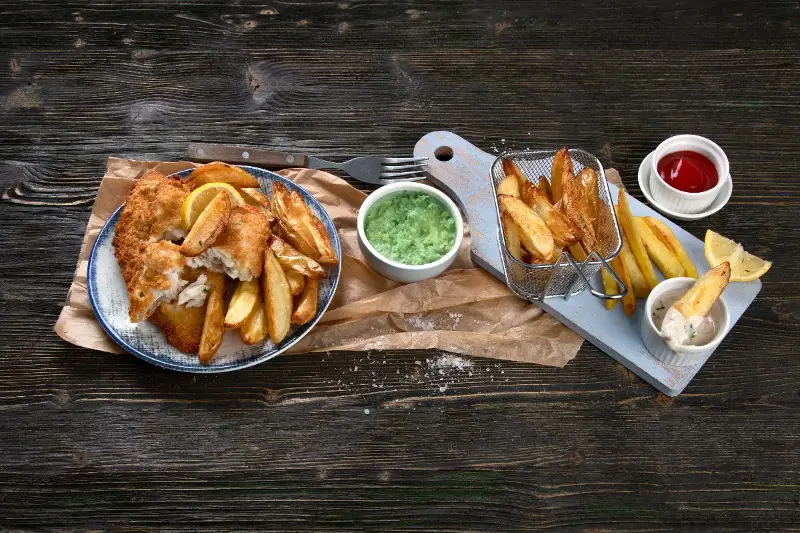Few dishes capture the spirit of England quite like fish and chips. With its golden, crispy batter and fluffy chips, this iconic meal is not just a beloved comfort food—it is a testament to the nation’s history and the enduring power of simple pleasures.

Origins: A Humble Marriage of Tradition
Fish and chips began as two separate culinary traditions centuries ago. Fried fish was introduced to England in the 17th century by Jewish immigrants from Spain and Portugal, who brought with them the technique of coating fish in flour and frying it. The chips, meanwhile, have roots in France and Belgium, where thin strips of potato were commonly fried as a street snack.
The union of fried fish and chips as we know it today likely occurred in the mid-19th century. As the Industrial Revolution swept through England, cities grew rapidly and working-class communities flourished. In 1860, Joseph Malin, a Jewish immigrant, is widely credited with opening the first fish and chip shop in London’s East End, bringing the two together in what would become a culinary sensation.
A Dish for the Masses
Fish and chips quickly became a staple of the British working class. The meal was affordable, filling, and easy to eat on the go—qualities that made it ideal for factory workers and families looking for a hearty meal after a long day. At one point, it was claimed that even Queen Victoria enjoyed eating fish and chips in secrecy.
By the early 20th century, there were around 25,000 fish and chip shops across the United Kingdom. During both World Wars, the dish was deemed so essential to morale that it remained one of the few foods not subject to rationing. For many, fish and chips became a symbol of British resilience, unity, and everyday joy during tumultuous times.

The Craft of the Chippy
Each region of England takes pride in its unique twist on the national favourite. Whether it’s the traditional cod and chips wrapped in yesterday’s newspaper or haddock served with a side of mushy peas, every chippy (the British nickname for a fish and chip shop) adds its own flavour to the tradition.
Equally fascinating is the attention to technique. The finest chippies know that batter must be mixed to just the right consistency and fried at the perfect temperature to ensure a delicate crunch. The best chips should be thick-cut, steaming inside, and golden on the outside. Add a sprinkle of salt and malt vinegar, and the transformation from humble ingredients to national treasure is complete.
An interesting fact: In some regions, customers enjoy their fish and chips with unexpected accompaniments such as curry sauce or gravy—testament to the adaptability and local character of this irresistible dish.
A Tradition That Continues to Evolve
Today, fish and chips remain a cherished part of British culture, with over 10,000 specialist shops still serving the dish nationwide. While some enjoy it as a nostalgic treat at the seaside, others see it as a quick comfort on a busy evening in the city.
In recent years, new generations of chefs have put modern spins on the classic, offering gluten-free batters, innovative fish varieties, and even plant-based ‘fish’ alternatives. Yet, at its heart, fish and chips continues to be about simple pleasures and shared moments—a dish that brings people together, regardless of background.

From Street Food to National Icon
The story of fish and chips is one of transformation: from the street corners of Victorian London to the heights of British culinary acclaim. More than just a meal, it’s a piece of living history—one that began with resourceful immigrants and thrived through industrial innovation and national hardship.
Whether enjoyed by the seaside, after a night out, or as a Friday night tradition, fish and chips is a warm hug from England’s past. So the next time you tuck into this crispy classic, remember that you are taking part in a story that spans centuries, uniting millions in their love of something beautifully simple, and deliciously British.
